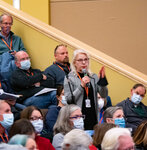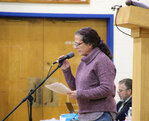











Dueling Special Town Meetings Monday in Manchester and Essex offered different experiences for voters this week. In Essex, it was a smooth evening of town business, where less than 200 voters easily approved nearly all 20 articles on its Warrant, including $1,150,000 to acquire an 11.5-acre parcel of land on Apple Street and a series of transfer station business items before closing business just after 8:30 p.m.
In Manchester, 550 residents showed up at ME Middle High School and settled in for a 6:30 p.m. Town Meeting that, due to unexpected crowds and technical challenges with the electronic voting system, began nearly an hour late. Technology issues persisted throughout the evening, but by separating voting waves and using hand counts for key articles, Moderator Alan Wilson was able to move through eight of the 14 articles on the Warrant before the remaining articles were passed over, ending the meeting just after 10 p.m.
In the end, Manchester voters approved all articles presented. They approved a recall measure for elected officials; $130,000 to fund the initial legal defense of the ZBA’s denial of the 40B permit for the SLV project in the Limited Commercial District, as well as $450,000 to fund a replacement for a 12-year-old Fire Department ambulance; and they approved a series of Planning Board articles to update portions of the town’s zoning bylaw.
The first article that saw “debate action” was a citizen’s petition brought by Ronald Skates of Boardman Ave. that would seek a special act of the State Legislature to allow the recall of local elected officials. Skates said the measure was triggered by the Select Board’s decision earlier this year to ignore a non-binding referendum vote by residents to keep Manchester’s public safety dispatch services local. (Following the referendum, the SB approved a move to a state-run regional dispatch service in Middleton.)
“I think the majority should rule,” Skates said, adding that other neighboring towns like Wenham, Ipswich, and Boxford have adopted recall provisions.
Former Select Board Chair Eli Boling said recall measures could be a great help to towns, but the bar to achieve a recall should be high and difficult to achieve. Boling spoke of his time on the Board when it faced Covid emergency measures and the state-mandated negotiation with SLV in the 40B process. He said the Board couldn’t avoid unpopular actions that may not have been readily understood by residents who weren’t attending every meeting. Skates’ article requires just 50 signatures to get a recall started. Boling said it should be more like 200.
He also said recalls should be triggered by specific illegal activity, malfeasance, or dereliction of duty.
“Let’s, please, set a more rigorous bar,” Boling said. Election recalls should be “a recourse, not a weapon.” The article was amended and passed easily.
Then came Articles 4-16 from the Manchester Planning Board (PB) proposing various changes to the Zoning By-law. The changes were the result of three years of work by the Board, including 100 meetings, public forums, and an open house, according to Planning Board Çhair Ron Mastrogiacomo, who introduced the slate of articles. He said the proposed new by-laws follow a clearer format, and are updated to be consistent with new state laws and court cases. One new use (senior housing) is proposed, along with changes in the permitting processes for certain small apartments and new non-conforming uses.
In a departure from typical Town Meeting format, Moderator Wilson allowed Christine Delisio to present a rebuttal that followed Mastrogiacomo. Delisio, one of two PB members who voted against presenting the articles at Town Meeting, told voters that her board’s articles were premature. Wilson said he allowed Delisio’s request to speak, but noted that it “would not be a precedent."
Sheila Pidgeon Hill, chair of the newly formed special interest group Manchester Matters, urged voters Monday to deny the Planning Board’s articles. Two weeks before Town Meeting, Pidgeon Hill apologized for an anonymous “government lookalike” postcard her group mailed to all town residents that was a near replica of a Manchester Town Meeting mailer sent the week before. The Manchester Matters mailer illegally used the Manchester town seal and, unlike the official mailer, lobbied voters to vote down the Planning Board articles.
Then the voting. Article 4, which replaced Sections 1-4 of the bylaw and added new definitions and a Use Table, passed.
Article 5, proposing to move junked cars, curb cuts, and stormwater regulations to the General Bylaws where they would be administered by the DPW, was split into two votes when the Planning Board’s Mary Foley made a motion to separate curb cuts from the article. Foley said curb cuts should be the domain of the Planning Board.
Her fellow board member, Chris Olney, said the language in the bylaw currently offered no guidance on curb cuts and said Manchester is virtually alone in the Commonwealth in having residential curb cuts governed by a Planning Board. He also said the PB has no engineering expertise or authority, and the DPW does.
Foley’s proposed amendment failed by just two votes. Then, Article 5, with the curb cuts language, passed easily.
Articles 6 and 7, both clerical in nature, passed.
Article 8 proposed an update to the General Regulations mainly by improving the criteria for approving projects that need a special permit and/or site plan review.
Back in Essex and its Monday Special Town Meeting, the drama was far lower. Of the 20 articles, all but one passed and all those that passed did so easily.
First up was business at the Essex Transfer Station, Articles 2, 3, and 4, and residents approved all three easily.
Back on August 31, when the annual transfer station stickers were set to expire for all residents, the town moved to six-month sticker system while it explored the future of trash and recycling service options that could include in the future the current transfer station only, or curbside service, or a combination of both. Article 2 approved a new sticker fee to continue this. The increased fee structure to access the town’s transfer station from Feb. 1 to June 30, 2023 is $250 and $125 for senior citizens age 65+.
Essex residents approved $165,000 to fund the trash vendor contract and $12,500 for general maintenance (Article 3). They also approved $280,000 for transfer station improvements and repairs, including replacing the current trash compactor with new equipment; purchasing and installing a new recycling handler; replacing the perimeter fencing; and repairing (or replacing) any other elements of the transfer station building.
Article 11 was the evening’s biggest financial expenditure, and voters approved $1,150,000 that will enable the town to exercise a “right of first refusal” and purchase an 11.5-acre parcel of open land on Apple Street that abuts the transfer station. The land was put under agreement by two LLCs at that price in September, triggering a 120-day window for the town to act. By purchasing the property, the town will have options in the future to create a new entrance to the transfer station, develop the land, or reserve it for open space and/or recreation. The article passed with the required two-thirds majority.
The only article that failed was Article 10 from the Historic District Commission, seeking $20,000 for a consultant to perform research and historical property surveys and advise the commission. Resident Ed Neal said owners in the Historic District are challenged enough with restrictions. The article failed, narrowly.